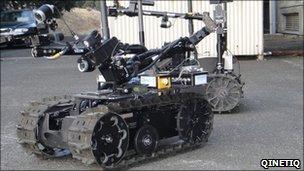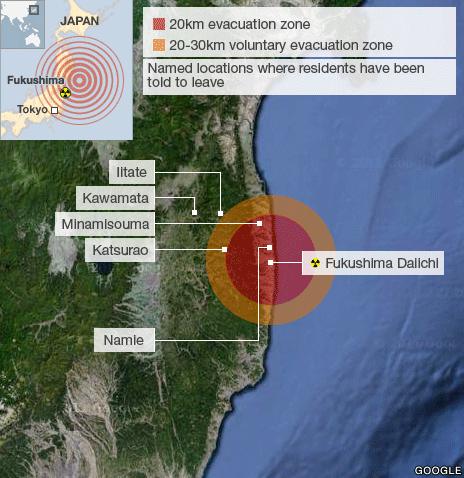Robots record high radiation levels at Japan reactors
- Published
The BBC's Roland Buerk says that people are pleased that they have been given some idea of how long the crisis could last
Remote-controlled robots are being used at the quake-hit Fukushima nuclear plant to measure radiation levels.
The readings from two reactor buildings showed a "harsh environment" for humans to work in, complicating efforts to stabilise the damaged reactors.
It comes a day after the plant operator said it expected to bring the crisis under control by the end of the year.
New opinion polls suggest a majority of people in Japan are dissatisfied with the government's handling of events.
The polls, published in three national newspapers, suggest that Japanese people are losing patience, more than a month after the country was hit by a devastating earthquake and tsunami.
Two-thirds of those surveyed said they backed increased taxes to pay for reconstruction, the cost of which has been estimated at $300bn (£184bn) - the most expensive natural disaster in history.
'Unforeseen setbacks'
Engineers are still struggling to bring the Fukushima Daiichi nuclear plant under control after vital cooling systems were knocked out by the tsunami.
Emergency workers have been unable to enter any reactor building since the disaster.

A UK firm's robots are being used to take readings in reactors
Elevated levels of radiation were measured by robots inside the buildings housing reactors No 1 and 3 on Sunday.
The plant's operator Tokyo Electric Power Co (Tepco) said exposure to radiation levels in the No 3 reactor for four-and-a-half hours would exceed the emergency safety limit for power plant workers.
Oxygen densities in both buildings were about 21%, high enough for workers to enter the buildings, the firm said.
"It's a harsh environment for humans to work inside," said Hidehiko Nishiyama of Japan's Nuclear and Industrial Safety Agency (Nisa).
Tepco is planning to send robots to take measurements inside the No 2 reactor later on Monday.
Tepco spokesman Takeshi Makigami said: "What robots can do is limited, so eventually, people must enter the buildings."
The plant operator said it hoped to reduce radiation leaks in three months and to cool the reactors within nine months.
Top government spokesman Yukio Edano acknowledged that Tepco's plans were feasible, but warned there could be unforeseen setbacks.
"I believe that this is definitely a workable solution. However, there are frequent aftershocks as we speak, and unfortunately, there have been cases where the situation deteriorated from lack of measures."
Mr Edano said he hoped some of the tens of thousands of families evacuated from the area around the power station would be allowed to go home eventually, but that it was hard to say when.
When pressed by reporters, he refused to confirm whether he believed they would all be able to return.
The issue for people in Japan is a shortage of information, says the BBC's Roland Buerk in Tokyo.
About two-thirds of respondents in the telephone polls conducted over the weekend by the Asahi Shimbun, Mainichi Shimbun and the Nikkei business daily said Prime Minister Naoto Kan should be replaced.
Opposition leaders have been urging the prime minister to resign, accusing him of weak leadership.
Mr Kan again faced criticism in parliament on Monday - with one opposition lawmaker suggesting he had been ill-prepared from the outset.
Mr Kan remained defiant, saying: "Japan has never before faced a crisis like this... We are doing our utmost."
He said he has no plans to resign before rebuilding Japan.
The latest police figures put the death toll from the 11 March disaster at 13,843, while more than 14,000 people remain unaccounted for.
Half of those killed were elderly; 95% of the dead in Miyagi prefecture, one of the worst-hit areas, drowned, according to new police statistics.
Japanese buildings are highly engineered and most withstood the record earthquake - the tsunami it triggered was the bigger killer, our correspondent says.
